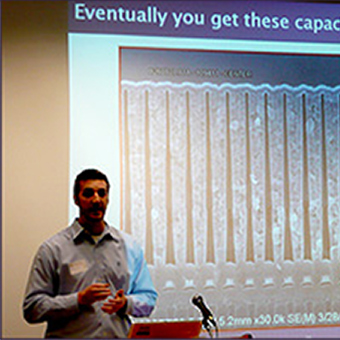
I felt the topics you learn in MSE really prepare you for a high tech career.
We chatted with Chandler to learn more about his experiences at the University of Maryland, and find out what he's doing today.
Why did you choose to study at the University of Maryland?
A major reason I chose to study at UMD was a phone call I received from Professor [Ichiro] Takeuchi. He explained the [Materials Science and Engineering] program to me, the opportunities it offered, the department size, etc. He really sparked my interest, because I saw MatSci as a good mix between physics and chemistry. Another major reason was the campus. It's gorgeous and it has a the feel of a small campus while being a big school.
Why did you decide to major in Materials Science and Engineering?
Basically I thought it sounded cool. I didn't want to build cars or design airplanes, and I felt the topics you learn in MSE really prepare you for a high tech career. I also really liked atomic physics, and saw a lot of great classes in that area in the MSE curriculum (solid state physics, atomic thermo, and kinetics to name a few). The department size was very personal, so I got to know all of my teachers and classmates very well.
What was the best thing about majoring in MSE, or your favorite "MSE experience"?
The class size. Most of my in-major classes were under 10 people. Classes were extremely interactive and very personal. It was a great way to learn. Another fun part was the group study sessions we had in the lounge! Everyone really came together to help each other out.
What was your favorite class, and why?
It's a toss-up. Solid State Physics with Professor [Ichiro] Takeuchi was a favorite because he's such a great teacher, and he made extremely difficult topics (k-space, for example) easy to understand. My notes still read like a textbook to this day.
My other favorite was Semiconductor Processing with [Professor Gary] Rubloff. It was very informative, and we touched on the latest processing in the industry so I was very prepared for my job. Working in the semiconductor industry now, that class gave me a leg up on a lot of other candidates coming in. I was already familiar with a lot of the process flow in a fab lab, and it has helped tremendously. Plus, it was a fun class.
Were you involved in research, internships, conferences, or other activities while a student?
I worked with [Professor Luz] Martinez-Miranda on the self-alignment of the biomimetic AlFeOOH. We prepared samples and ran experiments, and modeled the behavior under a magnetic field. It was my first real lab work. I was also lucky enough to attend two MSE conferences: one in Charlotte and another in San Francisco.
I was in the Materials Engineering Society [MatES] through graduation. I was also the president of my fraternity, Phi Kappa Tau, and was in the Order of Omega, the Greek honor society. I participated in the Arts Scholars program freshmen and sophomore year and was in the ski and snowboard club through college.
What do you recommend students do or get involved in to have the best experience here?
MatES is a great way to get involved with your department and your classmates—they are your best resource for learning. If you find any clubs or organizations interesting, just stop by and see what they're about. Participating in those expands your group of friends and opens you up to new activities. Lastly, getting involved in the Greek system is a great way to meet new friends and get great leadership experience, which is an asset to take into your career.
What have you been doing since you graduated? How have your engineering skills helped in your job or in other activities that you have been involved with since leaving Maryland?
Currently I work for Micron Technology, Inc., in Manassas, Virginia. We are one of the largest DRAM and FLASH memory producers in the world. I work in the Wet Process Department, which is essentially responsible for all wet cleans, wet etching, plasma stripping of resist, and copper electroplating. I started off as a shift engineer out of college, then became the shift lead. Now, I am the Lead of Leads, and coordinate shift operations for the department. The engineering skills I learned at Maryland have helped in a number of ways, most notably in critical thinking, design of experiments, and systematic analysis of problems, which play a major part in my day-to-day activities. Every day we are troubleshooting a new issue, and we have to collect, analyze and act on a wide range of data to make critical operational decisions. Of course, the understanding of chemistry and physics is a big help. Also, the semiconductor processing class gave me a very good knowledge base coming in to this industry.
Outside of work, I currently am the Chapter Advisor for Phi Kappa Tau at UMD, and am very active with the alumni in the area in setting up philanthropy events and fundraisers with the chapter. I currently live in Courthouse, in Arlington, Virginia.
Top